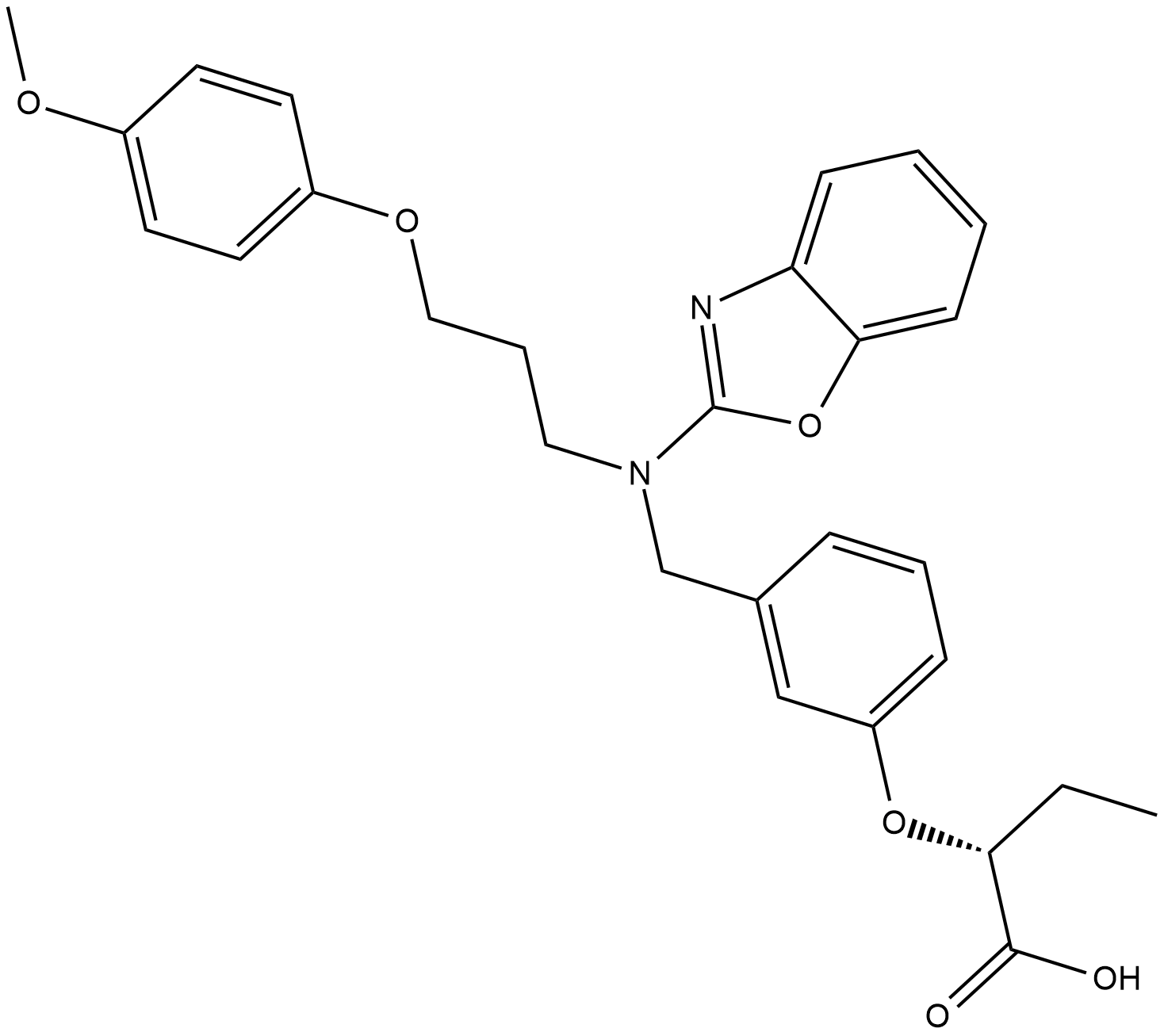Pemafibrate |
| Catalog No.GC19280 |
Pemafibrate (K-877) is an oral peroxisome proliferator-activated receptor (PPAR)-α agonist for the treatment of hyperlipidaemia, EC50 on Gal4hPPARα = 1 nM.
Products are for research use only. Not for human use. We do not sell to patients.

Cas No.: 848259-27-8
Sample solution is provided at 25 µL, 10mM.
Pemafibrate (K-877) is an oral peroxisome proliferator-activated receptor (PPAR)-α agonist for the treatment of hyperlipidaemia, EC50 on Gal4hPPARα = 1 nM [1].
Pemafibrate (10 µM, 24 h) regulated the expression of several target genes that code for proteins involved in carbohydrate and lipid metabolism, in primary human hepatocytes and the mouse liver [2]. Pemafibrate (50 nM, 24h) activated PPAR-α transcription activity and more effectively than fenofibrate and pirinixic acid (Wy14643) [3].
Pemafibrate (0.001% in MF diets for 1 week) significantly reduced plasma triglyceride and total cholesterol levels, increased plasma HDL cholesterol levels, regulated gene expression related to triglyceride and HDL cholesterol metabolism in the liver, and regulated cholesterol and triglyceride metabolic gene expression in the small intestine in mice [4]. Pemafibrate also promoted cholesterol efflux and reverse cholesterol transport, exerted anti-inflammatory activity, and decreased atherosclerotic lesions [1]. Pemafibrate was more effective than fenofibrate at suppressing the postprandial increase of chylomicrons and the accumulation of chylomicron remnants, thereby attenuating postprandial hypertriglyceridaemia [5].
References:
[1]. Hennuyer N, Duplan I, Paquet C, et al. The novel selective PPARα modulator (SPPARMα) pemafibrate improves dyslipidemia, enhances reverse cholesterol transport and decreases inflammation and atherosclerosis[J]. Atherosclerosis, 2016, 249: 200-208.
[2]. Raza-Iqbal S, Tanaka T, Anai M, et al. Transcriptome analysis of K-877 (a novel selective PPARα modulator (SPPARMα))-regulated genes in primary human hepatocytes and the mouse liver[J]. Journal of atherosclerosis and thrombosis, 2015: 28720.
[3]. Takei K, Han S, Murayama Y, et al. Selective peroxisome proliferator‐activated receptor‐α modulator K‐877 efficiently activates the peroxisome proliferator‐activated receptor‐α pathway and improves lipid metabolism in mice[J]. Journal of Diabetes Investigation, 2017, 8(4): 446-452.
[4]. Takei K, Nakagawa Y, Wang Y, et al. Effects of K-877, a novel selective PPARα modulator, on small intestine contribute to the amelioration of hyperlipidemia in low-density lipoprotein receptor knockout mice[J]. Journal of pharmacological sciences, 2017, 133(4): 214-222.
[5]. Sairyo M, Kobayashi T, Masuda D, et al. A novel selective PPARα modulator (SPPARMα), K-877 (pemafibrate), attenuates postprandial hypertriglyceridemia in mice[J]. Journal of atherosclerosis and thrombosis, 2018, 25(2): 142-152.
Average Rating: 5 (Based on Reviews and 20 reference(s) in Google Scholar.)
GLPBIO products are for RESEARCH USE ONLY. Please make sure your review or question is research based.
Required fields are marked with *




















